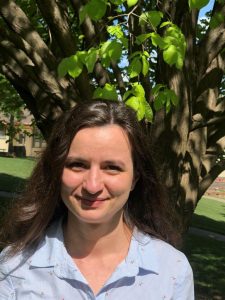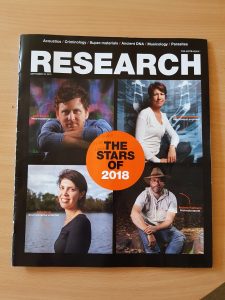Recently one of our industry’s young and upcoming poultry scientists was nationally recognised in a special magazine edition in The Australian newspaper. Titled ‘Research’ the magazine details Australia’s scientific leaders in each field. Dr Priscilla Gerber from the University of New England was recognised in the magazine as a leader in the field of Veterinary Medicine. Dr Gerber is also a recipient of current funding from Poultry Hub Australia and I was lucky enough to catch up with her recently to ask her thoughts on being named in the magazine and her current research projects. Below is an excerpt of the interview.

- Can you give me an outline of your career history to date?
I am a veterinarian with a record of research into control and diagnostics of infectious diseases of livestock.
I always loved animals and had a dream to become a zoo veterinarian since I was a young child. Soon after I started veterinary school I realised I had no interest in clinical practice and started looking for alternative options. When I was half way through vet school I started an internship at the Animal Virology Laboratory, Federal University of Minas Gerais, Brazil as part of a scientific initiation program aimed at training undergraduate researchers. It simply blew my mind. I was thrilled by the possibility of learning new methods, collecting and analysing samples and writing up the results. I knew this was exactly the career I wanted.
I completed my veterinary degree (2007) and MSc in Preventive Veterinary Medicine-Virology (2010) at the Federal University of Minas Gerais, Brazil. I then worked as a research associate at Iowa State University, USA while pursuing my PhD in an extremely productive and vibrant laboratory. Upon my thesis defence in 2014, I started a postdoctoral research fellowship at the Roslin Institute, University of Edinburgh, UK which involved setting up a new laboratory which was challenging but extremely rewarding. I relocated to Australia in Sep 2016 and started a research fellowship at the University of New England, Australia. In 2017 I became the youngest editor for the Journal of Virological Methods.
A main motivation for my research is to find solutions for problems that directly impact livestock producers. In prior research appointments at Iowa State University and at the University of Edinburgh I have worked primarily using pigs as animal models to research vaccine efficacy, pathogenesis of emerging viruses, and for developing diagnostic tools. As my research is guided by end-user needs I am actively working towards strengthening links with industry.
At UNE I started working with chickens as animal models to investigate infectious diseases, including immune responses and diagnostics. The ultimate goal of my research is developing improved infectious disease control and monitoring strategies to assure animal health and welfare.
I am currently working towards optimising methods for monitoring disease incursion and live vaccination success in chicken flocks using an environmental sample, dust, as a diagnostic sample. This work is in collaboration with Professor Steve Walkden-Brown at UNE.
I am also interested in studying the mechanisms of cellular immunity against infectious laryngotracheitis virus, which is responsible for extensive respiratory disease outbreaks in NSW and VIC and other parts of the world.
- In 10 years, what do you hope to have achieved in your career?
I look forward to building a strong and collaborative research team to continue delivering results that can be readily translated into solutions to the problems faced by the livestock industry. Training the next generation of researchers would be a great achievement.
- How did you feel when you found out you had made it into The Australian Research Magazine?
I was surprised when I received the news through a colleague. Overall this recognition gave me renewed strength and motivation for pursuing my research endeavours. It is extremely rewarding to have your work recognised nationally.
- What advice would you give to students just finishing their PhD on how to succeed in research?
I don’t think there is a single path for success and I believe that is important to think more broadly about career opportunities. Choosing an area that you are genuinely curious and excited about makes it much easier to invest the time and energy necessary to conduct research and to overcome the frustrations that are inherent to this career. Developing clarity in thinking and good scientific writing skills are also essential to promote yourself and gaining visibility.
For me it was helpful to learn different techniques and to work in several projects at the same time during my MSc, PhD and post-doctoral fellowships, so when one was stuck, I could move forward in other fronts.
- Other than research and work what other activities or interests do you have?
I enjoy traveling and exploring new places and cuisines.



